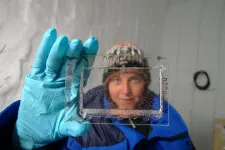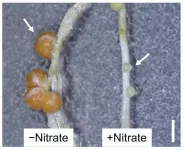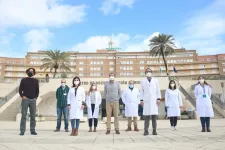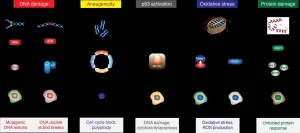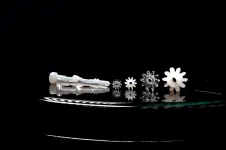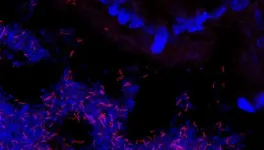Sustained COVID-19 vaccine willingness in Denmark following the rare cases of blood clots
The willingness to be vaccinated against coronavirus remains unchanged -- at 89% -- after Danes learned of the reports of rare blood clots, which led to the AstraZeneca vaccine being paused; this is shown by a new study from Aarhus University
2021-04-09
(Press-News.org) Nine out of ten Danes say that they will accept the COVID-19 vaccine when offered. This is the same level as before the AstraZeneca vaccine was paused.
This is shown by a questionnaire-based survey collected by Søren Dinesen Østergaard and co-authors. He is professor at the Department of Clinical Medicine at Aarhus University and affiliated with the Department of Affective Disorders at Aarhus University Hospital, Psychiatry.
"In February 2021, we asked a sample of Danes whether they were willing to be vaccinated against the coronavirus, and 89 per cent replied that they would. This picture was unchanged when the same people were asked again after the pausing of the AstraZeneca vaccine," says Søren Dinesen Østergaard.
The approximately 1,500 participants answered the questions about vaccination for the first time in the period between 4-21 February and then again in the period between 15-25 March. Danish health authorities paused the use of the AstraZeneca vaccine on 11 March - initially for 14 days before extending it until 9 April.
The survey also shows that many Danes feel insecure about the safety of the AstraZeneca vaccine. On a scale from 0-10, where ten is the safest, AstraZeneca scored just over five on average, while the vaccine from Pfizer scored above eight. As could be expected, it is those who do are not willing to be vaccinated who feel most insecure about the AstraZeneca vaccine after the reported blood clots.
"The fact that 89 percent still maintain that they willing to be vaccinated testifies to the high degree of trust in the Danish healthcare system. The extended pause indicates that the healthcare system is thoroughly investigating the cases of blood clots and thus takes our safety seriously. I think the population sees this as due diligence. If anything, it will probably increase confidence in the healthcare system," says Søren Dinesen Østergaard.
On the other hand, the research group is uncertain that all the people who say they are willing to be vaccinated will actually roll up their sleeves for the jab. It is well-known from survey research that 'good behaviour' is often over-reported, because people give what they think is the 'right' answer. A phenomenon called social desirability bias.
"If this bias plays a role here, it likely means that the vaccine willingness has been overestimated in this study, but probably to the same extent before and after the pausing of the AstraZeneca vaccine," says Søren Dinesen Østergaard.
According to the researchers, the low level of confidence in the safety of the AstraZeneca vaccine is an important signal to the health authorities.
"The results indicate that there will be a need to rebuild the population's trust in the AstraZeneca vaccine if its use is resumed," he says. So far, more than 140,000 Danes have received the AstraZeneca vaccine. The Danish Medicines Agency is currently investigating reports of blood clots in combination with a low number of blood platelets occurring among individuals having received the AstraZeneca vaccine. One case in Denmark has had a fatal outcome, and this case resembles several deaths elsewhere in Europe.
INFORMATION:
The research results - more information
The study is based on data from a questionnaire-based survey carried out by Epinion - who received payment for conducting the survey. In the February wave of the survey, the researchers asked about the willingness to be vaccinated. After use of the AstraZeneca vaccine was paused in March, the same people were again asked about their vaccine willingness. A total of 1,491 survey participants have responded to both waves, and the results are weighted so that they are representative of the Danish population on a number of parameters.
The following were partners in the project: Professor Kim Mannemar Sønderskov and Professor Peter Thisted Dinesen from the Department of Political Science at Aarhus University and the University of Copenhagen, respectively.
ELSE PRESS RELEASES FROM THIS DATE:
2021-04-09
Throughout the last ice age, the climate changed repeatedly and rapidly during so-called Dansgaard-Oeschger events, where Greenland temperatures rose between 5 and 16 degrees Celsius in decades. When certain parts of the climate system changed, other parts of the climate system followed like a series of dominos toppling in succession. This is the conclusion from an analysis of ice-core data by a group of researchers that included postdoc Emilie Capron and associate professor Sune Olander Rasmussen from the Section for the Physics of Ice, Climate and Earth at the Niels Bohr ...
2021-04-09
Tsukuba, Japan - Plants in the bean family (legumes) form nodules on their roots to take up nitrogen. Legumes will stop nodule production when nitrogen is plentiful (Figure 1), but precisely how nitrate presence controls nodule formation in these plants has been a mystery. Now, researchers from Japan have found that interactions between proteins and nitrate can induce and repress genes, controlling nodulation with potential applications in sustainable agriculture.
In a study published in April in The Plant Cell, a research team from the University of Tsukuba has shown that the different DNA-binding properties between proteins that establish nodule development determine if genes involved in symbiosis that govern nodulation turn on or off and that ...
2021-04-09
Two studies led by the Mental Health Unit of the Virgen del Rocio University Hospital and involving researchers from the US conclude that antipsychotic drugs could have a protective effect against SARS-CoV-2. For this reason, patients treated with these drugs have a lower risk of becoming infected or suffer a milder form of the disease if they do become infected.
Thus, a first descriptive epidemiological study of a sample of 698 patients treated with antipsychotics at the Seville hospital revealed that antipsychotic drugs could provide protection against both infection and the tendency to clinical severity of Covid-19 infection. "These are very interesting findings that reflect a clinical reality where we see few patients ...
2021-04-09
Since the beginning of the coronavirus pandemic, scientists and physicians worldwide undertook enormous efforts to understand the disease caused by the virus. In their latest collaborative study, researchers from the Max Planck Institute of Immunobiology and Epigenetics in Freiburg and physicians from the University of Freiburg Medical Center unveil a novel feature of COVID-19 immunity, which could have implications for future therapies. The study points to the involvement of Interleukin 33, an important danger signal, when immune cells encounter Sars-CoV-2 for a ...
2021-04-09
An international group of scientists led by the RIKEN Cluster for Pioneering Research have studied the chemical composition of 50 protoplanetary-disk forming regions in the Perseus Molecular Cloud, and found that despite being in the same cloud, the amounts of complex organic molecules they contain are quite different. Interestingly, the chemically rich young disks have similar compositions of organic molecules. These findings raise an important question: do solar-like systems share a common chemistry at birth?
It was once believed that complex organic molecules were rare in the universe, and that this rarity ...
2021-04-09
Imperial Brands scientists have utilised Toxys' ToxTracker suite of stem-cell based in-vitro assays, which provide mechanistic insight into the potential DNA damaging properties of chemicals, comparing vape e-liquid samples and their aerosols to combustible cigarette smoke.
Imperial scientists are the first to publish results using the ToxTracker system for the assessment of vape e-liquids and aerosols, and it forms part of the company's continuing research into the tobacco harm reduction potential of Next Generation Products (NGPs) such as vapes.
The assays help assess how product samples may impact cellular functioning across six reporter cell lines, picking up the tell-tale molecular signs of potential harm in the ...
2021-04-09
Glass is ubiquitous, from high-tech products in the fields of optics, telecommunications, chemistry and medicine to everyday objects such as bottles and windows. However, shaping glass is mainly based on processes such as melting, grinding or etching. These processes are decades old, technologically demanding, energy-intensive and severely limited in terms of the shapes that can be realized. For the first time, a team led by Prof. Dr. Bastian E. Rapp from the Laboratory of Process Technology at the Department of Microsystems Engineering at the University of Freiburg, in collaboration with the Freiburg-based start-up Glassomer, has developed a process that makes it possible to form glass easily, quickly and in almost any shape using injection ...
2021-04-09
The unpopular guests are already here. Hazel-, alder- and elm tree pollen sweep in over us during the early spring months, with birch pollen following in May. Then grass follows in June-July before mugwort pollen closes the season in late summer. All leading to more and more people suffering.
Over fifty years, the proportion of young Danes who sneeze, rub itchy eyes or suffer a blocked nose because of pollen has grown from 7-8 per cent in the 1970s to 24 per cent today. And for asthma, the proportion has risen from 4 to 12 per cent during the same period. ...
2021-04-09
Diet and the gut microbiome
With the consumption of a single type of vegetable such as spinach, hundreds of chemical components enter our digestive tract. There, they are further metabolized by the gut microbiome, a unique collection of hundreds of microbial species. The gut microbiome thus plays a major role in determining how nutrition affects our health. "So far, however, the metabolic capabilities of many of these microorganisms in the microbiome are still unknown. That means we don't know what substances they feed on and how they process them," explains ...
2021-04-09
Researchers at Lund University in Sweden have discovered that bird blood produces more heat in winter, when it is colder, than in autumn. The study is published in The FASEB Journal.
The secret lies in the energy factories of cells, the mitochondria. Mammals have no mitochondria in their red blood cells, but birds do, and according to the research team from Lund and Glasgow this means that the blood can function as a central heating system when it is cold.
"In winter, the mitochondria seem to prioritize producing more heat instead of more energy. The blood becomes a type of radiator that they can turn up when it gets colder", says Andreas Nord, researcher in evolutionary ecology at Lund University who led the study.
Until ...
LAST 30 PRESS RELEASES:
[Press-News.org] Sustained COVID-19 vaccine willingness in Denmark following the rare cases of blood clots
The willingness to be vaccinated against coronavirus remains unchanged -- at 89% -- after Danes learned of the reports of rare blood clots, which led to the AstraZeneca vaccine being paused; this is shown by a new study from Aarhus University
